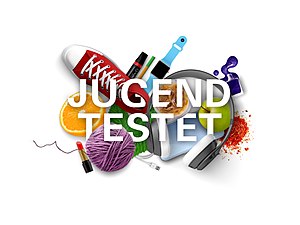Youth tests
Jugend testet is a youth competition organized by Stiftung Warentest in Germany, in which young people can test goods and services independently . A jury made up of test experts from Stiftung Warentest and other experts from the media and consumer protection will award the best tests . The aim of the competition is to encourage critical consumer behavior among young people. The patron is Federal Consumer Protection Minister Heiko Maas .
procedure
At Jugend tests , young people test products and services independently. There are no thematic guidelines. The participants choose their topic themselves, organize the test products independently, come up with test criteria and test methods for a comparative product test . At the end, they submit a report describing their entire test, how it was performed, and the results.
The competition takes place annually. The new round always starts at the beginning of the school year in September. Registrations are usually possible until the end of the year. The deadline for submitting the completed competition entries is February 15th.
The award ceremony usually takes place in June before the start of the summer holidays in Berlin . The award winners and their award-winning tests will be presented on the Internet . In addition, numerous media and the publications of the Stiftung Warentest - test , Finanztest and test.de - report on the winners.
Conditions of participation
Young people between the ages of twelve and 19 can take part. The deadline for submitting entries is the deadline for the age of participants, usually February 15th. Individuals, groups or school classes can take part . Advice from adults (e.g. teachers) is permitted, but must be specified.
Competition entry
Participants submit a report on their test for the competition. The report may contain a maximum of ten A4 pages. In this report, the participants describe the test, that is, what they examined and why, how they went about it and what they found out. In addition to the ten pages, the participants submit a short version (one page with questions, research methods, results).
jury
The jury consists of test experts from Stiftung Warentest and other experts from the media and consumer protection . It evaluates how the tests were carried out, how cleanly it was worked and documented and whether the test is understandable. The most important criteria for the evaluation of the jury are:
- Topic: originality, questions, benefits for other consumers
- Procedure: systematics, accuracy, completeness, information and knowledge gain
- Presentation: understandability, clarity (tables, graphs)
There is no need for time-consuming laboratory tests or chemical analyzes - more important are a well thought-out approach and creativity in the development of examination methods that are appropriate and also feasible for students.
Prices
In total, there are cash prizes with a total value of 12,000 euros to be won, as well as prizes in kind and trips to Berlin.
There are two competition categories, each with three main prizes:
Competition category product tests
- 1st prize: 2500 euros
- 2nd prize: 2000 euros
- 3rd prize: 1500 euros
Competitive category service tests
- 1st prize: 2500 euros
- 2nd prize: 2000 euros
- 3rd prize: 1500 euros
Goals of the competition
With the competition Jugend testet the Stiftung Warentest would like to promote the critical use of products, services and advertising among young people, according to §2 of its statutes: "The purpose of the foundation is to promote consumer protection." This is achieved through the intensive discussion of young people with the Goods and services that you test: Before you start your tests, you have to set up test criteria and weight the individual criteria against each other.
history
The youth tests competition has been held since 1979. Initially it took place every two years, and since 2007 annually. In 1993, 1995 and 1997 the competition was not announced.
Every year around 2000 young people take part, mostly in small teams who submit between 500 and 600 test reports. Over 40,000 young people have taken part since the competition was launched (as of June 2016).
Individual evidence
- ↑ Youth tests competition at www.jugend-testet.de
Web links
- Homepage of youth tests
- Bravo put to the test by Berliner Zeitung on January 4, 2010
- Does Pop help the chicken lay eggs? When students become testers Jetzt.de from September 20, 2006
- Further school projects of the Stiftung Warentest
- [1] , Focus
- [2] Hamburger Abendblatt
- [3] , FAZ
- [4] , Main Post
- [5] , Saxon newspaper
- [6] , Tagesspiegel
